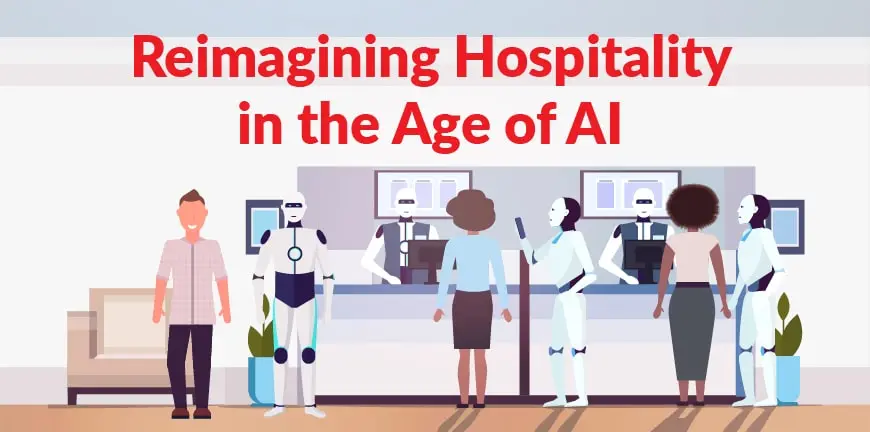
Growth of GCCs in the Middle East in 2024 and Global Impact
27/08/2024
What is Vendor Compliance and How does it Work?
29/08/2024The hospitality industry has embraced AI drastically in recent years. AI’s ability to swiftly process a ton of data, recognize patterns and make better informed decisions, is extremely desirable as it facilitates personalized service much more efficiently which is exactly what is required in hotels, restaurants and other hospitality industries. AI’s robust technology including robotics, natural language processing and data analysis, all of which can replicate human like behaviour and intelligence can help enhance guest experience and optimize business processes.
Facilitating better guest experience through AI
What is the one thing every guest expects from the hospitality industry? Catering to their preferences. AI can make this happen and how! Embracing AI can help with transforming and shaping the future of travel, restaurant experience and leisure.
1. Customized guest experiences using AI
AI can process data and offer better insights into what a customer prefers facilitating a customized guest experience. Imagine going to a hotel and your preferred food options are available, your room is exactly how you want it, you get the room of your preference and so many other things that matches your taste exactly! AI can go through vast data including previous bookings, feedback and preference in no time and help the hospitality industry offer unique experiences tailored to the taste and preferences of the guest.
2. Digital assistants at your service 24/7
One of the most common things guests generally complain about is that there is delayed or no response from the hotel staff at times. With digital assistants, not only do guests get to experience interaction with a machine that is so human-like but can also get responses to their questions, modify their reservations etc seamlessly.
AI can be so beneficial in fulfilling the needs of customers so much faster and offer the best quality of service. Not only will this help with high customer satisfaction, but you can definitely expect repeated bookings from the same guest fostering higher customer loyalty.
Better Operational Efficiency with AI
The hospitality industry has a lot of responsibility. Along with offering great experiences to the guests, it’s also crucial that they maintain operational efficiency because how else are they going to make it in such a competitive landscape and stay on top of their game?
1. Automation of repetitive tasks
There are a lot of repetitive tasks and back-end operations that do not require human intervention anymore, especially with the advent of AI technology. Some of these tasks could include billing, taking reservations, assigning rooms to guests etc. With all the data already processed by AI, it makes it easier for the transition to take place, from human intervention in routine operations to AI taking over, lessening the burden on the staff and putting their skills to better use and create the best environment possible for their guests.
2. Allow AI to manage your inventory better
Inventory management in the hospitality industry is very challenging, for obvious reasons. There is a lot to take care of and it must be taken care of extremely precisely. From making sure you have the necessary supplies to ensuring the quality of the toiletries etc are optimal, it’s an extremely sensitive and time-consuming task to be performed through traditional methods. A proactive approach to maintenance can help foster an environment where everything functions right and on schedule.
How can AI help in Revenue Management and Marketing?
1. AI can boost revenue
Artificial intelligence in face of revenue management can be a game changer. With AI’s capability you can easily determine the right pricing of products. Additionally, it is also easier to craft the right strategies for reaching potential buyers and identify and use the most effective sales channels to utilize.
With AI powered tools, organizations will be able to identify the best distribution channels and adjust prices that are attractive to guests and customers.
2. Craft effective marketing campaigns with the help of AI
AI enables marketing teams to understand distinct patterns of consumer demographics, preferences, and customer behaviours which facilitates the crafting of personalized marketing campaigns that can resonate on an individual level to all guests alike.
For example, marketing teams can send notifications to guests for a discounted weekend getaway at their beach resort or even recommend a wine-tasting experience at a boutique hotel, tailored to your love of gourmet travel.
Examples of Hospitality Businesses using Artificial Intelligence
Here are some real-world use cases where AI solutions have been effective in the hospitality industry-
1. Cosmopolitan of Las Vegas
Rose, a voice activated assistant, like Siri but tailored to meet the needs of the guests at Cosmopolitan. From receiving a calling card with Rose’s number, guests can text the number with their requests and queries, regarding requirement of toiletries or other services.
2. Wendy’s
This popular fast-food chain is devising new ways for customers to order food and leave feedback, employing speech-to-text and other AI-based technologies. Their partnership with Google Cloud has helped improve their business analytics.
Future of AI in the Hospitality Industry
AI in the hospitality industry is an amazing move to enhance guest experiences. However, finding the right balance between technology and personal interaction is something that must not be overlooked.
It’s essential to prepare the workforce for this technological shift as it could be beneficial for the organization if employees adapt to a data-driven environment to remain integral to operations. Ensuring that AI has been used in the right way, especially with regard to sensitive guest data and transparent interactions, is critical for maintaining trust and compliance.
The rapid evolution of AI is overwhelming and ensuring stable guest services and operations presents a challenge that requires thoughtful and strategic planning.
Contact Us For Business Enquiry

Rajkumar Shanmugam
Rajkumar Shanmugam is the Head of HR at ALP Consulting, bringing over 19 years of comprehensive HR leadership experience across India and international markets. His expertise spans talent acquisition, employee relations, performance management, compliance, and HR transformation. Rajkumar has a proven track record of driving people-centric initiatives, enhancing workplace culture, and aligning HR strategy with business goals. With extensive experience in US staffing operations and global mobility, he continues to lead organizational excellence through innovation and employee engagement.




